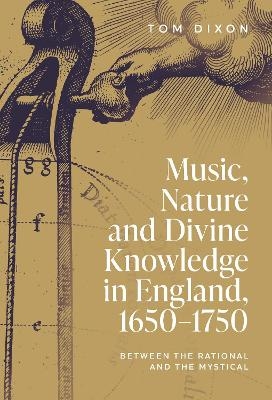
Music, Nature and Divine Knowledge in England, 1650-1750
Between the Rational and the Mystical
Seiten
2023
The Boydell Press (Verlag)
978-1-78327-767-4 (ISBN)
The Boydell Press (Verlag)
978-1-78327-767-4 (ISBN)
During a period of tumultuous change in English political, religious and cultural life, music signified the unspeakable presence of the divine in the world for many.
What was the role of music in the early modern subject's sensory experience of divinity? While the English intellectuals Peter Sterry (1613-72), Richard Roach (1662-1730), William Stukeley (1687-1765) and David Hartley (1705-57), have not been remembered for their 'musicking', this book explores how the musical reflections of these individuals expressed alternative and often uncustomary conceptions of God, the world, and the human psyche. Music is always potentially present in their discourse, emerging as a crucial form of mediation between states: exoteric and esoteric, material and spiritual, outer and inner, public and private, rational and mystical.
Dixon shows how Sterry, Roach, Stukeley and Hartley's shared belief in truly universal salvation was articulated through a language of music, implying a feminising influence that set these male individuals apart from contemporaries who often strictly emphasised the rational-i.e. the supposedly masculine-aspects of religion. Musical discourse, instead, provided a link to a spiritual plane that brought these intellectuals closer to 'ultimate reality'. Theirs was a discourse firmly rooted in the real existence of contemporary musical practices, both in terms of the forms and styles implied in the writings under discussion and the physical circumstances in which these musical genres were created and performed.
Through exploring ways in which the idea of music was employed in written transmission of elite ideas, this book challenges conventional classifications of a seventeenth-century 'Scientific Revolution' and an eighteenth-century 'Enlightenment', defending an alternative narrative of continuity and change across a number of scholarly disciplines, from seventeenth-century English intellectual history and theology, to musicology and the social history of music.
What was the role of music in the early modern subject's sensory experience of divinity? While the English intellectuals Peter Sterry (1613-72), Richard Roach (1662-1730), William Stukeley (1687-1765) and David Hartley (1705-57), have not been remembered for their 'musicking', this book explores how the musical reflections of these individuals expressed alternative and often uncustomary conceptions of God, the world, and the human psyche. Music is always potentially present in their discourse, emerging as a crucial form of mediation between states: exoteric and esoteric, material and spiritual, outer and inner, public and private, rational and mystical.
Dixon shows how Sterry, Roach, Stukeley and Hartley's shared belief in truly universal salvation was articulated through a language of music, implying a feminising influence that set these male individuals apart from contemporaries who often strictly emphasised the rational-i.e. the supposedly masculine-aspects of religion. Musical discourse, instead, provided a link to a spiritual plane that brought these intellectuals closer to 'ultimate reality'. Theirs was a discourse firmly rooted in the real existence of contemporary musical practices, both in terms of the forms and styles implied in the writings under discussion and the physical circumstances in which these musical genres were created and performed.
Through exploring ways in which the idea of music was employed in written transmission of elite ideas, this book challenges conventional classifications of a seventeenth-century 'Scientific Revolution' and an eighteenth-century 'Enlightenment', defending an alternative narrative of continuity and change across a number of scholarly disciplines, from seventeenth-century English intellectual history and theology, to musicology and the social history of music.
List of Illustrations
Editors' Foreword
Acknowledgements
Editorial Conventions
Abbreviations
Introduction
Part I
Chapter 1 Constructions of Musical Meaning
Chapter 2 Lives
Chapter 3 The Universities
Chapter 4 Urban Cultures
Chapter 5 The Impact of Newton
Part IIChapter 6 'Divinely Natural Magic'. Enthusiasm and Aesthetics in an Enchanted Universe
Chapter 7 'Ancient Harmonie'. Music and the Prisca Theologia
Chapter 8 Druids
Chapter 9 The Genius of Nature
Chapter 10 The Restoration of All Things
Editors' Afterword
Bibliography
Index
| Erscheinungsdatum | 18.04.2023 |
|---|---|
| Reihe/Serie | Music in Society and Culture |
| Zusatzinfo | 3 b/w illus. |
| Verlagsort | Woodbridge |
| Sprache | englisch |
| Maße | 156 x 234 mm |
| Gewicht | 620 g |
| Themenwelt | Kunst / Musik / Theater ► Musik ► Klassik / Oper / Musical |
| Geschichte ► Allgemeine Geschichte ► Neuzeit (bis 1918) | |
| Geisteswissenschaften ► Geschichte ► Regional- / Ländergeschichte | |
| Geschichte ► Teilgebiete der Geschichte ► Religionsgeschichte | |
| ISBN-10 | 1-78327-767-X / 178327767X |
| ISBN-13 | 978-1-78327-767-4 / 9781783277674 |
| Zustand | Neuware |
| Informationen gemäß Produktsicherheitsverordnung (GPSR) | |
| Haben Sie eine Frage zum Produkt? |
Mehr entdecken
aus dem Bereich
aus dem Bereich
Giordano Bruno - ein ketzerisches Leben
Buch | Hardcover (2024)
C.H.Beck (Verlag)
29,90 €
das dramatische 16. Jahrhundert
Buch | Hardcover (2024)
Rowohlt Berlin (Verlag)
34,00 €


